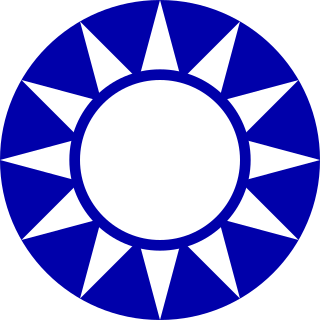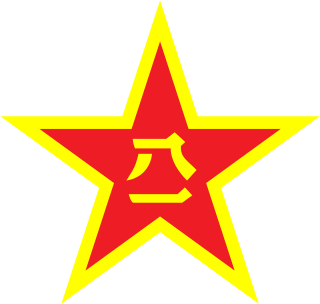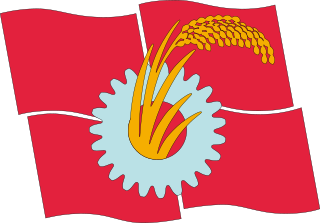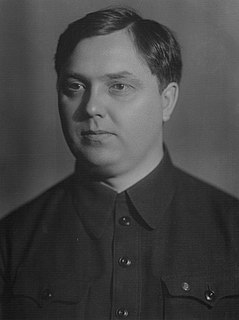
The Kuomintang (KMT), often referred to in English as the Nationalist Party of China or Chinese Nationalist Party (CNP), is a major political party in Taiwan, based in Taipei. Formed in 1919, the KMT was the sole ruling party of the Republic of China from 1928 to 2000 under the Dang Guo system, and is currently an opposition political party in the Legislative Yuan. The Kuomintang is one of the two historical contemporary parties in China, the other being the Chinese Communist Party (CCP).

Klaus Emil Julius Fuchs was a German theoretical physicist and atomic spy who supplied information from the American, British, and Canadian Manhattan Project to the Soviet Union during and shortly after World War II. While at the Los Alamos National Laboratory, Fuchs was responsible for many significant theoretical calculations relating to the first nuclear weapons and, later, early models of the hydrogen bomb. After his conviction in 1950, he served nine years in prison in the United Kingdom and then moved to East Germany where he resumed his career as a physicist and scientific leader.

The history of North Korea began at the end of World War II in 1945. The surrender of Japan led to the division of Korea at the 38th parallel, with the Soviet Union occupying the north, and the United States occupying the south. The Soviet Union and the United States failed to agree on a way to unify the country, and in 1948 they established two separate governments – the Soviet-aligned Democratic People's Republic of Korea and the Western-aligned Republic of Korea – each claiming to be the legitimate government of all of Korea.

Nuclear disarmament is the act of reducing or eliminating nuclear weapons. It can also be the end state of a nuclear-weapons-free world, in which nuclear weapons are completely eliminated. The term denuclearization is also used to describe the process leading to complete nuclear disarmament.

The People's Liberation Army (PLA) is the regular armed forces of the People's Republic of China (PRC) and of the PRC's founding and ruling political party, the Chinese Communist Party (CCP). Besides the Central Military Commission and several minor units directly under it, the PLA has five major service branches: the Ground Force, Navy, Air Force, Rocket Force, and the Strategic Support Force. A majority of military units around the country are assigned to one of five theater commands by geographical location. The PLA is the world's largest military force and constitutes the second largest defense budget in the world. The PLA is one of the fastest modernizing militaries in the world, and has been termed as a potential military superpower, with significant regional power and rising global power projection capabilities. Per Credit Suisse in 2015, the PLA is the world's third-most powerful military.

The Korean conflict is an ongoing conflict based on the division of Korea between North Korea and South Korea, both of which claim to be the sole legitimate government and state of all of Korea. During the Cold War, North Korea was backed by the Soviet Union, China, and its communist allies, while South Korea was backed by the United States and its Western allies. The division of Korea by external powers occurred after World War II had ended, starting in 1945, with the official division in 1948, tensions erupted into the Korean War, which lasted from 1950 to 1953. When the war ended, both countries were devastated, with utter destruction of much of the countries, but the division remained. North and South Korea continued a military standoff, with periodic clashes. The conflict survived the end of the Cold War and continues to this day.

The Cold War was a period of geopolitical tension between the Soviet Union and the United States and their respective allies, the Eastern Bloc and the Western Bloc, after World War II. Historians do not fully agree on the dates, but the period is generally considered to span the 1947 Truman Doctrine to the 1991 dissolution of the Soviet Union. The term "cold" is used because there was no large-scale fighting directly between the two superpowers, but they each supported major regional conflicts known as proxy wars. The conflict was based around the ideological and geopolitical struggle for global influence by the two powers, following their temporary alliance and victory against Nazi Germany in 1945. The doctrine of mutually assured destruction (MAD) discouraged a pre-emptive attack by either side. Aside from the nuclear arsenal development and conventional military deployment, the struggle for dominance was expressed via indirect means such as psychological warfare, propaganda campaigns, espionage, far-reaching embargoes, rivalry at sports events and technological competitions such as the Space Race.

The Japanese Communist Party is a political party in Japan and is one of the largest non-governing communist parties in the world.

Shigeru Ishiba is a Japanese politician. Ishiba is a member of the Liberal Democratic Party (LDP), and is the leader of the Suigetsukai party faction, and a member of the Heisei Kenkyūkai faction, which was then led by Fukushiro Nukaga, until 2011.
Japan Socialist Party (JSP), also known as the Social Democratic Party of Japan, was a left-wing political party in Japan that existed from 1945 to 1996.

The First Taiwan Strait Crisis was a brief armed conflict between the Communist People's Republic of China (PRC) and the Nationalist Republic of China (ROC) in Taiwan. The Taiwan strait crisis began when the PRC seized the Yijiangshan Islands and forced the ROC to abandon the Tachen Islands, which were evacuated by the navies of the ROC and the US.

The Japanese program to develop nuclear weapons was conducted during World War II. Like the German nuclear weapons program, it suffered from an array of problems, and was ultimately unable to progress beyond the laboratory stage before the atomic bombings of Hiroshima and Nagasaki and the Japanese surrender in August 1945.

Adam Rapacki was a Polish politician and diplomat

The Communist Party of Albania is a communist and anti-revisionist Marxist-Leninist political party in Albania. The party was formed in 1991, as a split from the Albanian Party of Labour which converted itself into the Socialist Party of Albania. It upholds Enver Hoxha and Hoxhaism. The party was led by Hysni Milloshi until his death in 2012.

The United States detonated two nuclear weapons over the Japanese cities of Hiroshima and Nagasaki on August 6 and 9, 1945, respectively. The two bombings killed between 129,000 and 226,000 people, most of whom were civilians, and remain the only use of nuclear weapons in armed conflict.

Kim Il-sung was the founder of North Korea, which he ruled from the country's establishment in 1948 until his death in 1994. He held the posts of Premier from 1948 to 1972 and President from 1972 to 1994. He was also the leader of the Workers' Party of Korea (WPK) from 1949 to 1994. Coming to power after the end of Japanese rule in 1945, he authorized the invasion of South Korea in 1950, triggering an intervention in defense of South Korea by the United Nations led by the United States. Following the military stalemate in the Korean War, a ceasefire was signed on 27 July 1953. He was the third longest-serving non-royal head of state/government in the 20th century, in office for more than 45 years.
During the Cold War (1947–1991), when the Soviet Union and the United States were engaged in an arms race, the Soviet Union promoted its foreign policy through the World Peace Council and other front organizations. Some writers have claimed that it also influenced non-aligned peace groups in the West, although the CIA and MI5 have doubted the extent of Soviet influence.

Georgy Maximilianovich Malenkov was a Soviet politician who briefly succeeded Joseph Stalin as the absolute leader of the Soviet Union. However, at the insistence of the rest of the Presidium, he relinquished control over the party apparatus in exchange for remaining Premier and first among equals within the Soviet collective leadership. He then became embroiled in a power struggle with Nikita Khrushchev that culminated in his removal from the premiership in 1955 as well as the Presidium in 1957.

The Chinese Communist Revolution, known in mainland China as the War of Liberation, was the conflict, led by the Communist Party of China and Chairman Mao Zedong, that resulted in the proclamation of the People's Republic of China, on 1 October 1949. The revolution began in 1946 after the Second Sino-Japanese War (1937–45) and was the second part of the Chinese Civil War (1945–49).

The Campaign for Nuclear Disarmament (CND) is an organisation that advocates unilateral nuclear disarmament by the United Kingdom, international nuclear disarmament and tighter international arms regulation through agreements such as the Nuclear Non-Proliferation Treaty. It opposes military action that may result in the use of nuclear, chemical or biological weapons and the building of nuclear power stations in the UK.
















